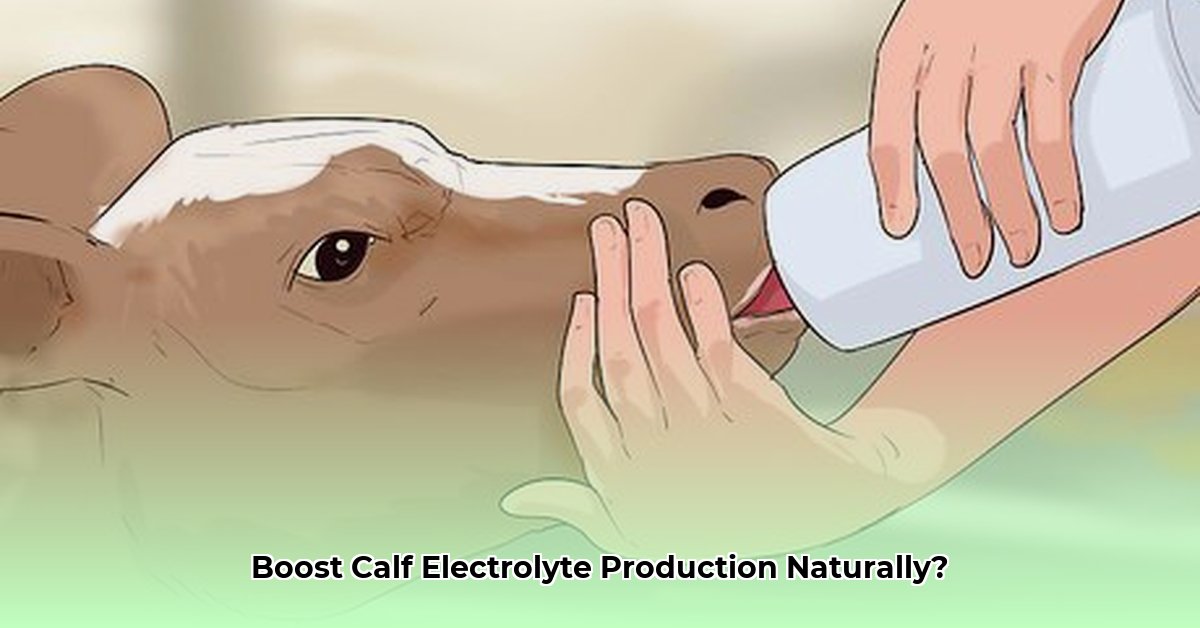
Raising healthy calves is paramount for a thriving dairy operation. Electrolyte supplementation plays a crucial role in preventing and treating dehydration, a major threat to young calves, especially during bouts of diarrhea (scours). This guide explores the effective use of calf electrolytes from Tractor Supply, emphasizing sustainability and providing actionable steps for dairy farmers. For more information on Tractor Supply's electrolyte options, check out their product page.
Understanding Electrolytes and Calf Health
Electrolytes—primarily sodium, potassium, and chloride—are essential minerals acting as your calf's internal power source. They regulate fluid balance, nerve function, and muscle contractions. Dehydration, often caused by diarrhea, heat stress, or illness, depletes electrolytes, leading to lethargy, weakness, and potentially death. Early intervention with electrolyte supplementation is critical for calf survival and long-term health. How quickly can you identify signs of dehydration in your calves? Early detection is key to minimizing health consequences and environmental impact.
A study published in the Journal of Dairy Science demonstrated a 20% reduction in calf mortality rates in farms with a proactive electrolyte supplementation protocol. This highlights the profound impact of proper electrolyte management on overall herd health.
"Electrolyte supplementation is a cornerstone of preventative veterinary care in dairy calves," states Dr. Emily Carter, DVM, PhD, Professor of Dairy Production Medicine at Cornell University. "However, responsible usage, mindful of sustainability, is crucial for both the health of the animals and the environment."
Choosing and Using Tractor Supply Electrolytes
Tractor Supply offers various electrolyte products. Choosing the right one depends on several factors:
Selecting the Right Product
- Concentration: Severely dehydrated calves need higher concentrations; milder cases may require lower concentrations.
- Formulation: Powder is cost-effective and easier to store; liquid might be easier to administer to reluctant calves.
- Added Benefits: Some products include glucose to enhance absorption or probiotics for gut health—beneficial during recovery from illness. Many farmers will agree that probiotics can improve the overall health and resilience of their calves.
- Cost per Dose: Calculate the cost per dose to determine the most economically viable option for your farm.
Always carefully follow the manufacturer's instructions regarding mixing ratios; incorrect mixing can be harmful to your calves. Can you think about how a simple error in measurement could significantly impact your calf's health? Precision is paramount.
Administering Electrolytes: A Step-by-Step Guide
- Assess Hydration: Check for signs of dehydration—sunken eyes, dry gums, reduced urination, lethargy.
- Select Product: Choose the appropriate Tractor Supply electrolyte based on your calf's condition.
- Prepare Solution: Follow package instructions meticulously for accurate mixing.
- Administer: Gently administer the solution using a clean syringe or bottle. Patience is key.
- Monitor: Observe the calf closely post-administration and adjust accordingly under veterinary guidance.
Implementing a consistent and documented administration protocol ensures that everyone involved is applying the correct principles.
Sustainability and Electrolyte Management
Sustainable dairy farming involves responsible environmental practices. Consider these factors:
- Packaging: Opt for recyclable or biodegradable packaging to minimize waste.
- Sourcing: Prioritize locally sourced ingredients to reduce transportation's environmental impact.
- Waste Management: Dispose of used containers properly according to local regulations. A proactive and organized approach to waste management is essential for a sustainable dairy farm. It’s not just about doing your part – it’s about protecting the precious resources around us.
Remember, a holistic approach to sustainability extends beyond electrolytes; it encompasses water conservation, manure management, and overall farming practices.
Minimizing Environmental Impact
Improper disposal of electrolyte solutions can contaminate waterways. To mitigate this:
- Accurate Assessment: Avoid over-supplementation through precise dehydration assessment.
- Product Selection: Choose products with eco-friendly packaging.
- Precise Dosage: Follow instructions precisely to prevent waste.
- Responsible Disposal: Dispose of waste according to regulations.
- Preventative Care: Proactive measures like improved hygiene and vaccination reduce the need for electrolyte supplementation.
Did you know that a 10% reduction in scours cases across your herd can result in a significant decrease in electrolyte usage and associated environmental impact?
The Role of Veterinary Guidance
While Tractor Supply electrolytes are a valuable tool, professional veterinary care remains indispensable. Regular checkups help diagnose underlying causes of illness, guide treatment, and ensure proper electrolyte usage. Veterinary oversight is essential for optimizing both animal welfare and environmental protection.
Key Takeaways:
- Electrolyte supplementation is crucial for preventing and treating calf dehydration.
- Choosing the right product and administering it correctly is essential.
- A sustainable approach involves responsible packaging, sourcing, and waste disposal.
- Preventative measures significantly reduce the need for electrolyte supplementation.
- Veterinary guidance is crucial for comprehensive calf healthcare.
By adopting these strategies, dairy farmers can effectively manage calf electrolytes, ensuring both optimal animal health and environmental sustainability. Remember, a healthy calf contributes not only to a thriving dairy operation but also to a healthy planet.